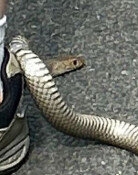Dog fighting
A bloodied 50-something man on March 20 raced into a convenience store in Cheongju, North Chungcheong Province and said, My daughter`s dead. Can you call the police? The store owner did so and 30 officers rushed there, only to find the man`s beloved dog, which was killed in a car accident. Dogs have become relatives in Korea in the era of the nuclear family.
"Goose father" is a term referring to a Korean man who sends his children abroad to study with their mother. One man said, My family, even my pet dog, went abroad, leaving me alone. Such fathers say their dogs are better off than they are. Fourteen centuries have passed since people first tamed dogs, but the latter are enjoying a better time now. Dogs are considered more patient and loyal to their owners than cats. Episodes with a dog and his or her owner are found everywhere in the world. A dog of Osu from Imsil County of North Jeolla Province is known to have been Korea`s version of Hachiko, a Japanese dog immortalized in the film "Hachi: A Dogs Tale. The Italian dog Pido died after waiting for his owner, who had been killed in a bombing. Dogs give up their freedom in return for food and shelter in choosing to live with people.
People have improved dog breeds based on their characteristics and appearances. In ancient times, large dogs with long legs were popular for use in hunting, rounding up animals, and guarding homes. Large hound breeds appear in ancient Egyptian remains from 3,400 B.C. The ancient Greeks raised dogs for military purposes, and East Asians used to eat dogs. A traditional song from rural Korea depicts the tradition of cooking dogs when a married woman visits her parents. Small and pretty pet dogs were raised by 15th-century European aristocrats who wanted to show off their status. The origin of fight dogs is the mastiff, or large dogs which appeared in games against wild beasts in Roman times. Tosas and pitbull terriers are also bred for fighting. Dogfights grew popular across Korea after Japanese tosas were introduced to the country until the 1990s. Dogfights were banned in 2005 after parliament passed a revised bill to the Animal Protection Act.
Recently, a gambling website for dogfights was found in Korea. The site aired dogfights live online and let people bet money on dogs. For the gamblers, dogs were not friends but tools to win money. Canines involved in the contests often bit each other and bled, but the websites commentator said things like They are jointly attacking the dog and We cant expect the result. Rene Descartes, the 17th century French philosopher, said, Human beings feel pain because they have reason. Modern science, however, has found that animals feel emotions including happiness and pain. An old expression says (One is) inferior to dogs. Would it be defamation to use this expression to greedy people who use cruel dogfights to win money?
Editorial Writer Park Yong (parky@donga.com)




![탈성매매女 “이달 지원금 540만원으로 줄어” 불만글 시끌 [e글e글]](https://dimg.donga.com/c/138/175/90/1/wps/NEWS/IMAGE/2025/12/26/133040473.3.jpg)


